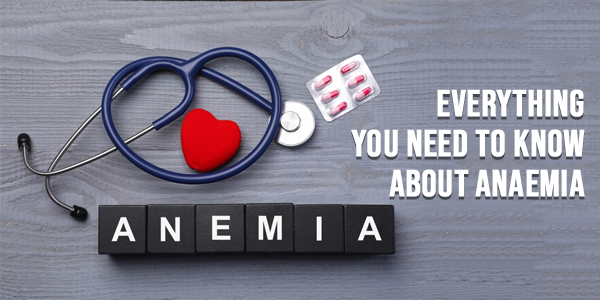There have been a series of health blogs but very few talk about anaemia. But what is anaemia and why is it important to talk about it? We will tell you all about it in this blog.
For those of you who do not know, anaemia is a serious condition related to your red blood cells.
Red blood cells are the main source that carries oxygen from our lungs and distribute it throughout our body. And they make a return with carbon dioxide back to our lungs which are then exhaled.
When you don’t have enough RBC you get what is called anaemia. In other words, having anaemia is also referred to as having low haemoglobin. Thus, making you feel weak and tired.
There are many forms of anaemia and each of these have its own causes and effects. It can either be temporary or permanent (long-term) with its effects ranging from mild to severe. While in most cases, it has more than one cause. If you have any signs of anaemia then you should seek a doctor right away. This is because it could be an early sign of serious illness.
There are treatments for anaemia but it depends on the cause. There are also ways to prevent some anaemia by having a good diet plan and staying healthy. If you want to know more, keep reading.
What are the different types of anaemia?
- Aplastic anaemia
- Iron deficiency anaemia
- Sickle cell anaemia
- Thalassemia
- Vitamin deficiency anaemia
What are the symptoms of anaemia?
Not all cases of anaemia are the same. The signs and symptoms vary based on the severity. Depending on the type of anaemia, you may develop these symptoms and signs of anaemia.
Also, make note that in the initial stage, there can be mild signs which you can barely notice. But as the symptoms grow, you’ll find out.
- Fatigue
- Weakness
- Pale or yellowish skin
- Irregular heartbeats
- Shortness of breath
- Dizziness or lightheadedness
- Chest pain
- Cold hands and feet
- Headaches
What are the causes of anaemia?
Anaemia causes are uncertain. It can be from birth or it develops as you grow older. This health issue happens when you do not have enough red blood cells. The causes of anaemia usually happen if your body does not make enough red blood cells on its own. Because of bleeding, losing a lot of red blood cells. Or due to illness that destroys the red blood cells.
Different kinds of anaemia have different causes which include the following -
Vitamin deficiency – Your body needs adequate amounts of vitamins, especially B-12 to produce healthy red blood cells. If you do not have a proper diet, chances are the RBC to decrease in production. It is best to include B-12 supplements in your diet to get all the nutrients you need.
Bone marrow disease – By affecting the production of blood in your bone marrow, a variety of diseases form like leukaemia and myelofibrosis.
Aplastic – This is rare anaemia when your body stops producing red blood cells. It can develop at any age. When aplastic anaemia happens, you will feel fatigued and open to various infections. Since there won’t be enough RBCs to fight against foreign bodies.
Hemolytic – The destruction of red blood cells is called hemolysis. It is due to the large group of anaemias. RCB is destroyed faster than bone marrow can replace it. You can have hemolytic anaemia from inheritance or you can develop it in later stages.
Iron deficiency – It is caused by a shortage of iron. Your bone marrow requires iron to make haemoglobin and without iron, it becomes difficult for your body to produce haemoglobin for RBC.
Sickle cell – In this kind of disorder, the red blood cells are unusually shaped like a sickle (used for cutting crops). It is an inherited condition which can be serious if you develop hemolytic anaemia. If you have the case of sickle cell, chances are you will lose RBCs quickly as the sickle cell dies prematurely.
Inflammation – Certain diseases can interfere with the production of RBCs like Cancer, HIV/AIDS, Kidney disease, Rheumatoid arthritis, Crohn’s disease etc.
What are the risk factors for anaemia?
Lacking vitamins and minerals – One of the major risk factors for anaemia is the lack of proper vitamins and minerals in the diet. Your diet should include iron, B-12 vitamin, folate and copper.
Intestinal disorders – Having a disorder in your intestine can put you at risk of having anaemia. The intestinal disorder affects the absorption of nutrients in your small intestines.
Pregnancy – Women who are pregnant have a higher risk of anaemia if they do not take multivitamins with folic acid and iron content.
Menstruation – Menstruation in women causes the loss of red blood cells. And women who have not had menopause have a higher risk of iron deficiency anaemia.
Chronic conditions – An individual who has chronic illnesses such as cancer, kidney infection etc. are at a greater risk of anaemia. Since these illnesses lead to a shortage of red blood cells.
How to treat anaemia?
Your healthcare provider will find out the cause of anaemia. Based on the result your treatment will begin. Iron-deficiency anaemia is treated with oral supplements. Food that is high in iron and vitamin C is good to include in your diet. Intravenous (IV) infusion is also considered if you have chronic kidney disease.
Another way to treat anaemia is through red blood cell transfusion. Since anaemia is caused by internal bleeding, the best option is to conduct surgery to stop the bleeding. Repair of anaemia via surgery has been conducted among those with the paraesophageal type of Hiatal hernias.
Sickle cell anaemia is another kind of anaemia which may require a bone marrow transplant. Treatment which includes injections of erythropoietin (EPO) may be used for CKD causing anaemia.
If you have cancer, you will undergo radiation and chemotherapy and these are the causes of anaemia. The solution is to stall the cancer treatment and treat the anaemia first. Your doctor will work on improving the iron, blood transfusions and getting necessary vitamins to stimulate your body to produce EPO.
What are the complications and preventions against anaemia?
If anaemia is life untreated, it can lead to many complications. Feeling extreme fatigue is a common side effect of anaemia. It can make you tired and weak. It can also complicate pregnancy, especially if you gave folate deficiency anaemia.
Heart problem is another effect of anaemia giving you a rapid or irregular heartbeat. This can turn into something serious with an enlarged heart or heart failure. Sickle cell anaemia can be life-threatening, it is associated with an increased risk of death.
There are several types of anaemia which can’t be prevented. But you can prevent two types of anaemia – Iron deficiency anaemia and vitamin deficiency anaemia. You can do so by including a variety of vitamins and minerals in your diet.
Iron-rich foods like meats, beans, lentils, dark green leafy vegetables and dried fruits are excellent. Folate which is a natural form of vitamin B9 can be found in fruits and leafy vegetables. As well as kidney beans, peanuts and grain products like bread, cereal, rice etc.
Include vitamin B-12 foods which include dairy products and soy products. Along with vitamin C foods which include citrus fruits, juices, broccoli, peppers, melons etc. these help increase iron absorption.
FAQs
The cause of anaemia is the loss of blood which reduces red blood cell production. It can also be because of menstruation, chronic illness, old age, etc.
The signs and symptoms include feeling weak, fatigued, pale or yellowish skin, irregular heartbeats, shortness of breath, dizziness, chest pain, headaches, and cold hands and feet.
Anaemia is not a disease but a condition or a disorder when something is not functioning properly in your body. Having anaemia means having low levels of red blood cells in your body. Your body does not have enough oxygen.
It depends on what type of anaemia you have. For instance, if you have iron-deficiency anaemia, you will be given iron orally along with vitamin C. These are the best way and the fasters to raise your iron levels. As iron is the basic necessity to produce haemoglobin in red blood cells.




